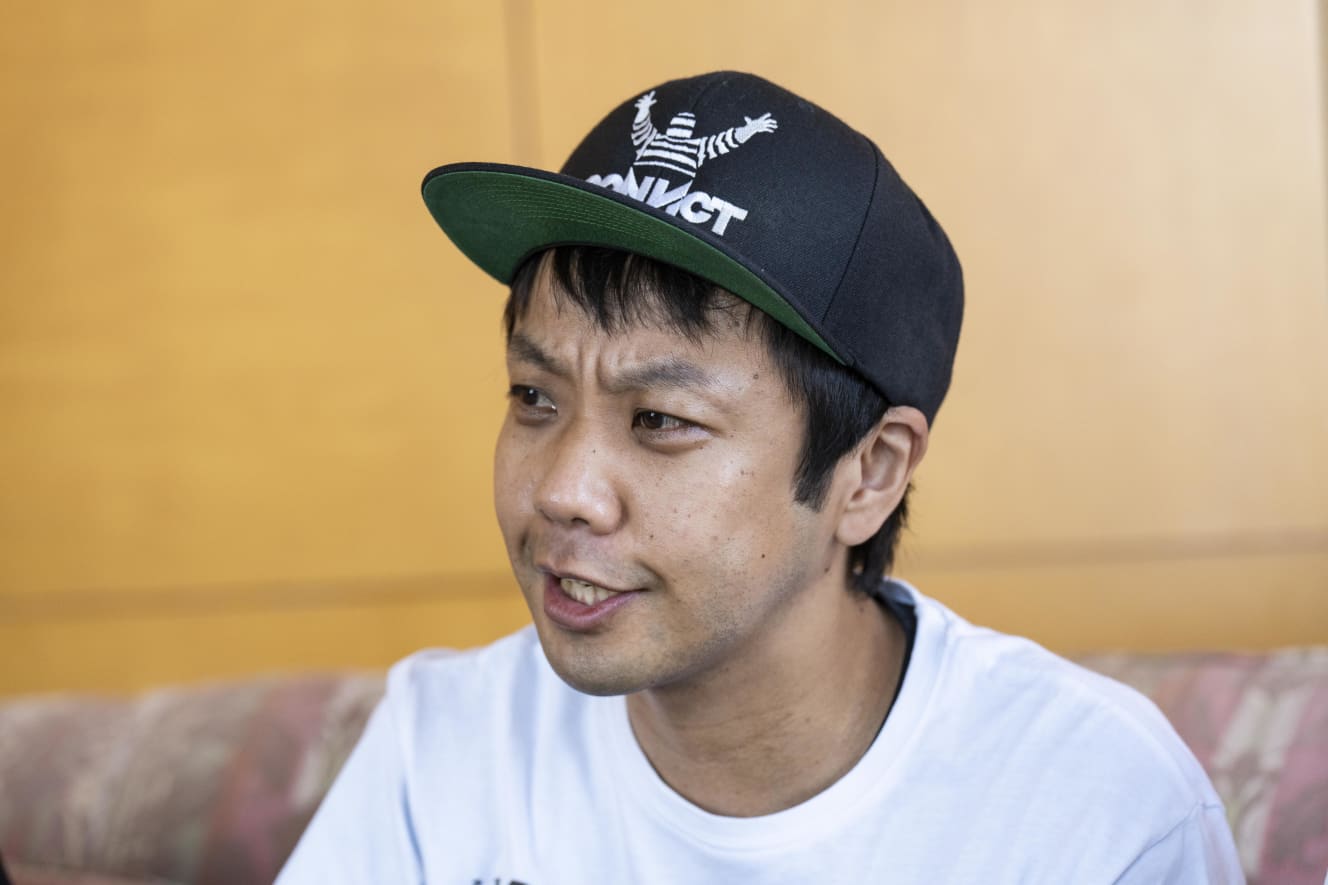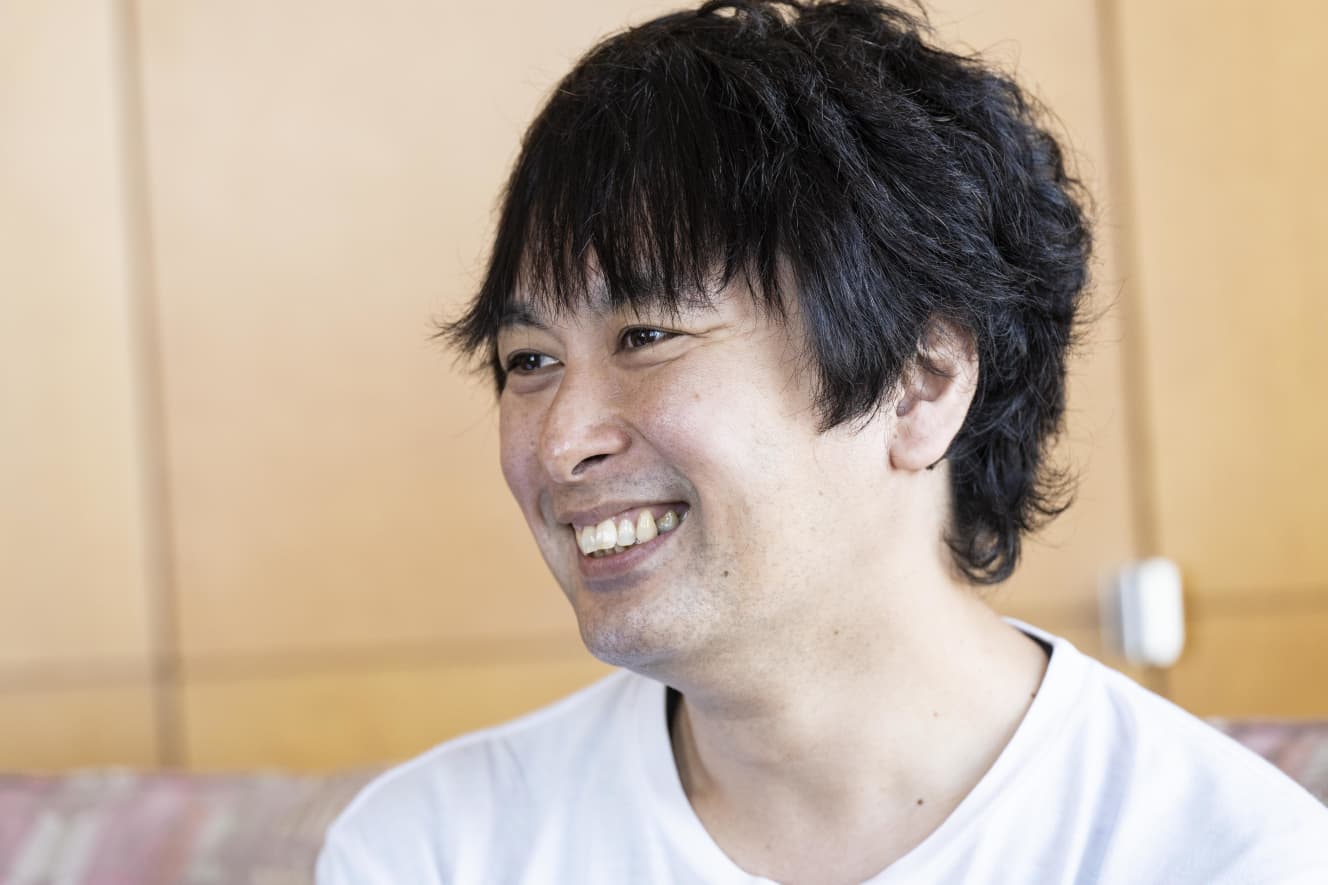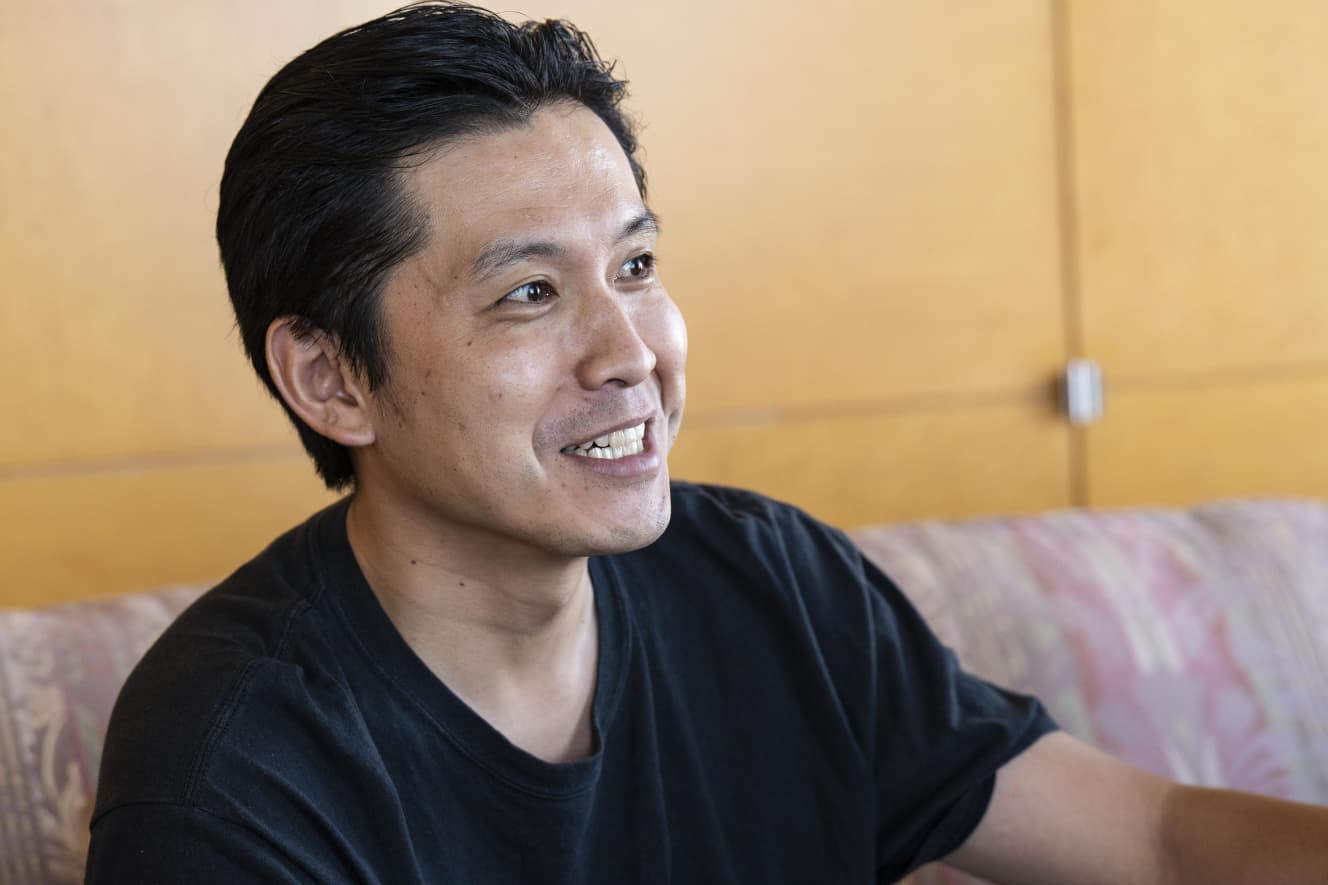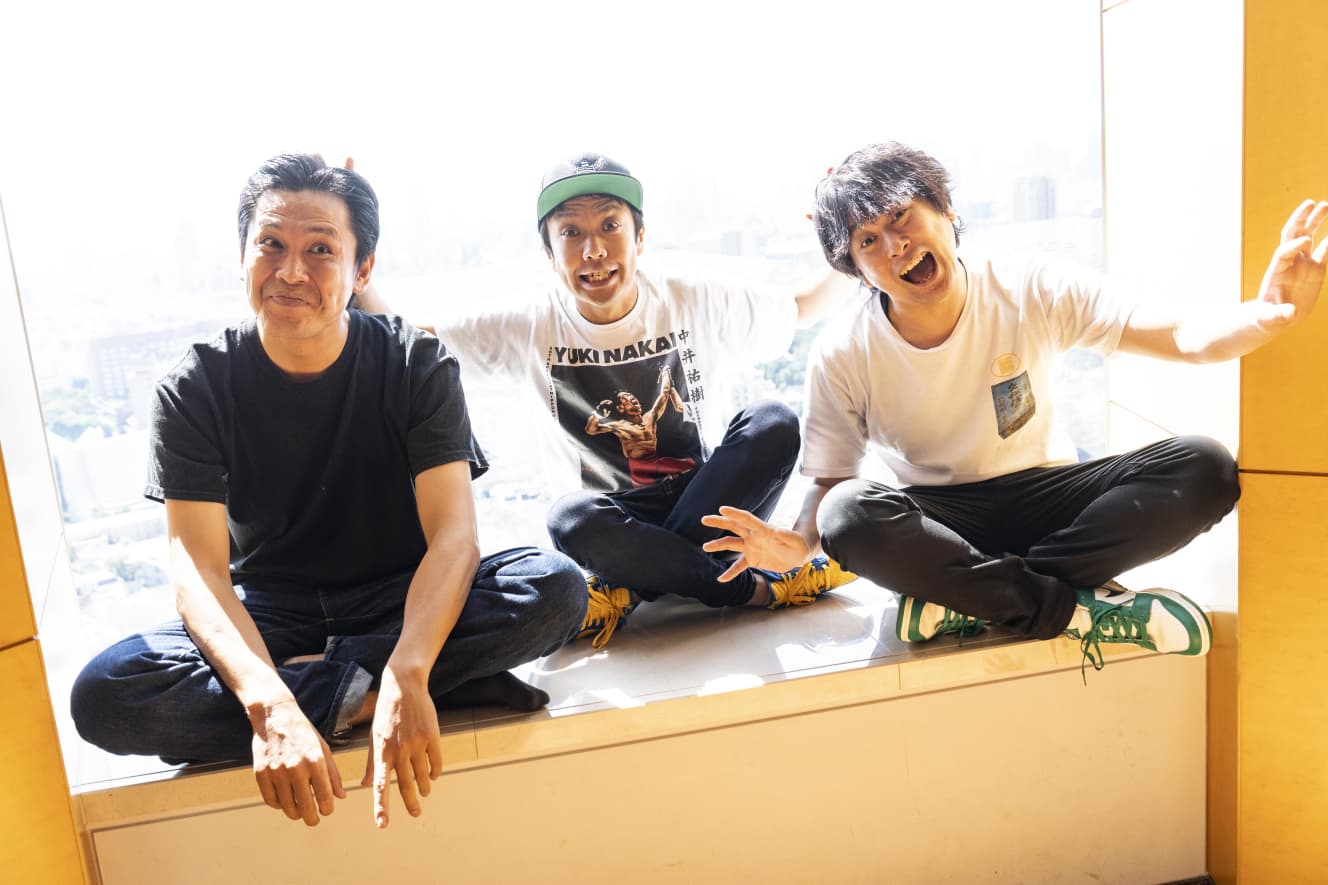Yadan reveals “The happiest conversation with Hitoshi Matsumoto in my life
2022 M-1, Road to KOC: "Yadan" [Part 2
There is a comedy trio that has long been recognized for its ability, but has made its first appearance in the finals of the “King of Conte 2022. They are Honma Kid, Nakajima Kyo, and Long Size Ito of Yadan. The oldest group in the competition, they have steadily stepped up their game, despite the disappointment of the new Coronas in 2020 and 2021.
What was the driving force behind the activities of the three – and how did they do it? From the background of their change in tsukkomi, the unexpected similarities with The Drifters, the past of yearly struggles due to lack of results, the environment surrounding Sony comedians with strong storytelling skills, to their conversation with Downtown’s Hitoshi Matsumoto, who says, “It was the happiest moment of my life,” we will look into the essence that shaped their current state.
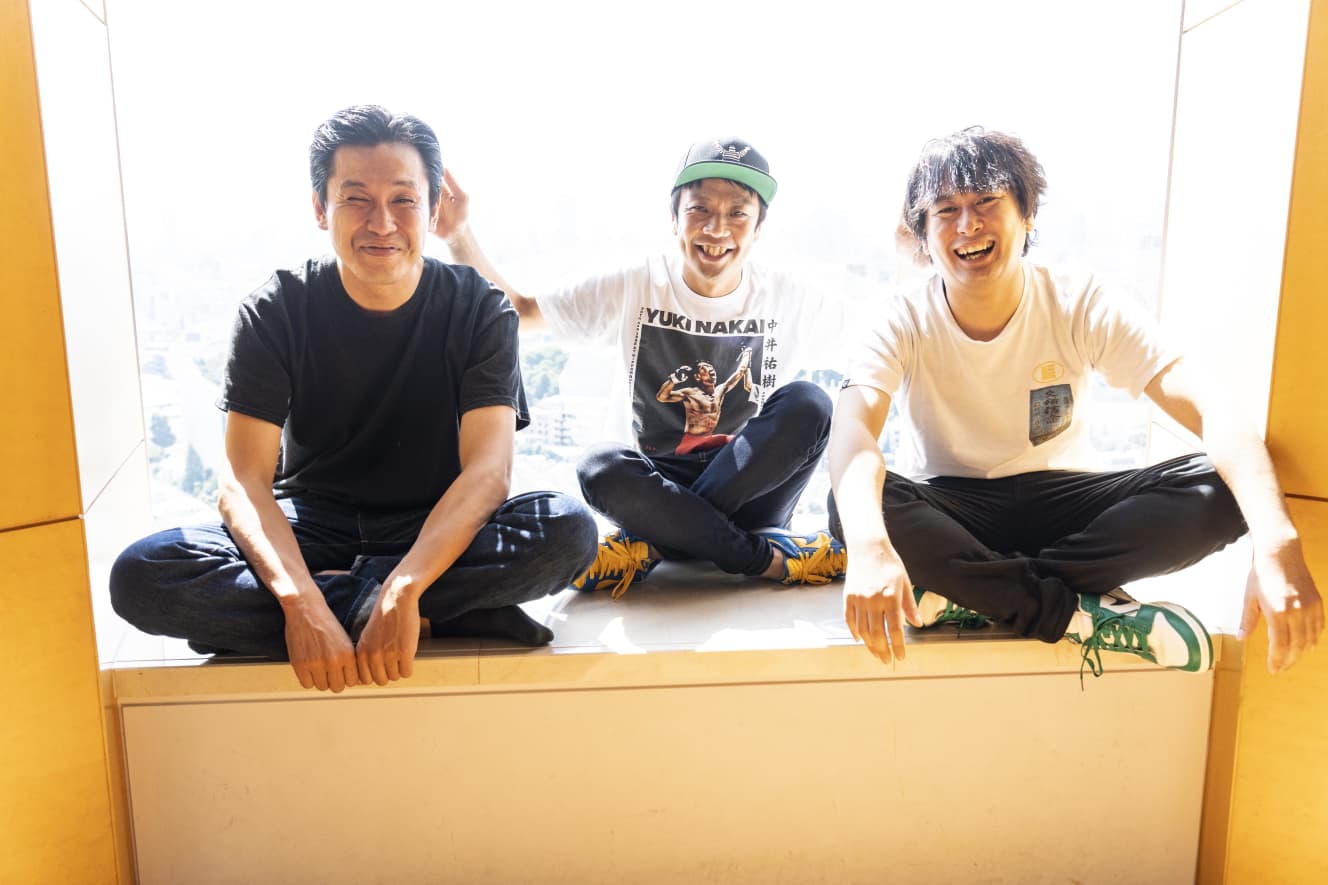
Background of the change in tsukkomi: “Reactor started to make us laugh.”
–When did the Tsukkomi change from Mr. Nakajima to mainly Mr. Homma?
Homma:What year was that?
Nakajima: Probably when I was about 30 years old.
Ito: Before, it was just me and Homma going wild, and Nakashi (Nakajima) would pick up the slack. However, Nakashi’s tongue is not so good, and his tsukkomi is not so powerful, so I think that’s why the style was changed.
Nakajima: When he got too out of control, I couldn’t stop him with my own power (laughs). (laughs) Also, it was a time when the form of comedy was changing. In the old days, it used to be the norm that the comedian would get a laugh out of the joke and the comedian would correct it.
Then King of Conte started, and the tsukkomi, or reactors, started to get a lot of laughs. Then, people thought, “This position should be filled by a funny person,” and Homma was chosen.
Ito: Exactly like Eiji Koge.
Nakajima: Yes, that’s right. The roles of “bokeh” and “tskkomi” have been reversed there as well.
–Ito: But you did not change after watching Baikingu, did you?
Nakajima: That’s right. When I adapted to the laughter of the times, I thought, “This is no longer possible.
ITOH: Another thing is that Nakashi said he was not good at acting. Nakashi played the role of a scary organization member who held a gun to my head when I was seized and said, “Hey! How did you hear about this hideout? Homma:To make it more powerful, we had to make it more dramatic.
Homma:To make it more powerful, I asked him to make his voice sound more doughy. Nakashi said, “Okay,” and got into it, and when he did it, he said, “How did you hear that? (the end rises) (laughs).
Ito: We got a lot of laughs during the pretending stage (laughs). There was no atmosphere at all, and we thought, “Oh, we’re screwed.
Homma: We couldn’t stop laughing either. Long and I kept laughing.
Ito: We were absolutely not supposed to laugh at that point.
Nakajima: I was scolded by my senpai at that time, too (laughs).
Similarities between Drift and Yadan, and the presence of a director who encouraged a leap forward
–Ito: So that’s how it all started (laughs). (laughs) In the first place, were you making situation comedy like you are doing now from the beginning?
Homma:We were basically situation comedy, but for a while we were swept up in the “God of Entertainment” (Nippon Television) boom, and we did some flip stories. But I got into my current style rather early on.
When I was in high school, I liked a five-member group called
–Homma:Yes, that’s what makes it great.
Homma: Yes, I really like that kind of thing. In “Katochan Ken-chan Gokigen TV” (TBS), there is a scene in a room of a detective agency where they make people laugh. Joby Joba also does that kind of scene. I like that kind of scene.
–The stage at Sony’s live house “BeachV” is small, isn’t it? How did you get used to a larger stage?
Homma:I guess it was doing a solo show at “Za Koenji” in July this year, where the maximum capacity of BeachV is 70 people, but we expanded the capacity to 250 people. In the end, 100 tickets remained, but I felt a lot of things from playing in such a large place.
I thought that if we played in the front, we wouldn’t be able to see the whole audience because of the wide space, so we tried playing very far back. I was trying various things, and Buffalo Goro A, who was watching me, said, “You don’t have any pressure. He said, “You don’t have any pressure,” and “You can go ahead and do it. I thought to myself, “I see. I learned a lot from Mr. A, such as how to show off.
–The Drifters also came from a small jazz cafe, and at some point, under the advice of director Shigeru Tsukada, they became accustomed to the large stage of the Japan Theatre and performed in “8:00! It is said that this led to the success of “8 O’clock!
Ito: That makes me very happy. That’s true!
Homma: But the last time we rehearsed at the TBS studio, we seemed to be working very far back. This time, the director told us to be more conscious of the front (laughs).
Nakajima: We were not used to the studio.
Ito: Maybe the corona (part of the splash prevention measures) made me back down. There were lines drawn on the stage and bamili (markers indicating where to stand on stage and where to place props, etc.) to tell us not to go any further forward.
Homma:There was also the age factor. When you are young, you are always in the forefront.
After losing in the KOC semifinals, they always quarrel: “I’m screwed.
–Homma:During your activities since 2007, was there ever a time when your motivation dropped or when the trio was in danger of dissolving?
Homma:No, we never broke up (laughs).
Nakajima:I think the fact that none of the three of us have girlfriends is a big factor. Many people quit because of girlfriends, but we are not so popular (laughs).
Ito: There are many reasons, such as family reasons, having a child, and so on.
Homma: We have no reason to quit. (laughs) “What are we going to do? Will it sell? (laughs).
–Homma: When you appeared on Tobiishi Renkyu’s YouTube channel, you said that Mr. Ito complained after losing in the semi-finals of King of Conte.
Homma: That’s right, he was always angry after the semifinals. I didn’t like it anymore. We were in the semifinals all the way from 2016 to 2019, but back then it wasn’t Corona, so all the semifinalists would gather at the venue and the finalists would be announced one by one.
We just watched in amazement as they were being interviewed on stage. (Laughs) It was very frustrating to see them do that right in front of us. I think that’s why Long (Ito) got angry with us as it was.
Ito: It is a bit discouraging to be told, “That’s all,” at the end of the presentation. The presentation was over in about 4 or 50 minutes, and the comedians were leaving in droves. Well, some of them got on the train right away, others went out for a drink. We would look for a place to smoke, and while having a smoke, we would ask them, “What are you going to do? What are you going to do? I would sometimes say things like, “I’m screwed,” “I’m going to be a comedian,” or “It’s too late for me to write a story,” and I would just end up saying hateful things to Homma.
Homma: I would say the same thing to him, and we would argue a lot (bitter laugh).
Nakajima: It was very serious at that time.
Ito: But it didn’t seem to linger. The next day, we would say, “Well, what are you going to do? and things go back to normal. When I look around, there are many cases where people get on bad terms or break up as a result of an award race.
Nakajima: Having three people in the group keeps a good balance. I’m the one who’s goofing off.
Homma:Mr. Nakajima acts as a balancer. That helps.
Sony comedians strong in storytelling, Noda-chan at the starting point of the no-no culture.
–I saw the “SMA Tryout Live Silver Eggs” held last month on September 17, and you always give a summary after the live performance. Do you think that the culture of being able to give each other bad advice is a big reason why Sony comedians have become so strong in their stories?
Homma:I think so. At first, we were a group of comedians who had failed at other companies. I think that culture developed because we were all hurt. It was like, “Here, why don’t you do this? Nakajima: Noda-chan and Robin.
Nakajima: I think it started with Noda-chan and Robinfoot Ogusan. They worked together part-time. They talked about their stories all the time, even during their part-time jobs.
Homma:That’s right. I joined them, and well, we talked only about comedy every day. Whenever Noda-chan had an important audition or job, he would show it to Ogusan. Whenever we appeared on “Bakusho On Air Battle” (NHK Sogo) or other programs, we would show them to Ogusan as well.
Somehow this trend spread, and I think we began to share our opinions with each other more and more, saying, “Please watch it live.
–I think Noda-chan’s style is very different from his onstage style.
Ito: He was very stoic about his material.
Homma: He found something amazing. Homma: He found something amazing. He said, “When I ask a comedian about a bad idea, he never lies. Of course, you can give boring advice and make them make mistakes, but when they actually try it and it doesn’t work, it is immediately obvious that “this is boring,” and they lose credibility as comedians.
Comedians want to be thought of as funny, so when they are asked, “How was it? I want to give them good advice, and I want them to think that I am definitely funny. So they say, “It’s best to ask a comedian. They will really think about it. I thought that was really amazing. I thought that was a great discovery.
Robinfoot Ogu’s golden rule: “It annoys me when you guys are funny, but…
–Sony has a number of award finalists, including Baikingu and Hollywood Zakoshisho. Whose words of advice were the most memorable for you?
Homma:The words of Robin Foot Ogusan have always stuck with me. When we were in our 20s, we were going to participate in “On Air Battle,” and we decided to try out our material on BeachV beforehand. At that time, Ogusan came to see us and gave us a lot of advice. In the middle of the launch, he said, “I’m going home,” so I went to see him off.
At that time, Ogusan said to me, “It annoys me a lot when you guys are funny on TV, but it also annoys me a lot when you give advice that is not good, so if it annoys you either way, it’s better to be funny and be annoyed. I thought he was a very honest person. Normally, he would have just said, “I gave you this much advice, so you should be upset,” but instead he said, “I’m upset that you guys are upset,” and that really touched me.
Ito: It’s one thing for him to give us advice, but for me, just having Kotoge-san and Shisho (Hollywood Zakoshisho) laugh at our material makes me feel like “I don’t need any more words. Of course, it is also because of their personalities.
Also, Captain Watanabe looked at our material before the “On Air Battle” and told us, “I can’t give you detailed advice the day before, so all you have to do is your feelings. You have to put your heart and soul into it. When I think about it now, it was completely mental (laughs), but there is no doubt what he said.
Nakajima: I don’t get comedy stories from my seniors, so I guess it’s the words of “Tomita,” which became the number one tsukemen restaurant in Japan with …… tsukemen. Tsuke in Matsudo. noodle shop in Matsudo. I asked him for advice on how to become the best in Japan, and he replied, “Always make an effort to entertain your customers.
He said that even at his ramen shop, he always makes small changes to entertain his customers and keeps brushing up on his skills to get to where he is today. That’s why I’ve been doing this for the past month, trying to entertain them with even one of my stories.
I was moved by his conversation with Hitoshi Matsumoto. That walk home was the happiest day of my life.
–Finally, the King of Conte finals are upon us. I performed with Downtown in a project called “Downtown no Gaki no Tsukasa ya Aahende! (Nippon Television Network Corporation).
Homma: I am looking forward to performing in front of Downtown.
Ito: We won the “SMA Hope Grand Prix” in 2019 ( Sony’s Comedy Contest to determine the No. 1 comedian ), Mr. Matsumoto (Hitoshi) made a surprise appearance at the ending. But he left in a cab rather quickly, so we didn’t have a chance to have a proper conversation.
Homma: But at the “Yama-1” event, I was able to talk with him a little when I went to greet him.
Ito: I was so happy. That Matsuchan turned to us and said a lot of things to us. I was a little too excited to remember the details (laugh), but he was very kind and said, “I think it’s good,” “Do you have another story? (laugh). There were a lot of other comedians there, so we had to move on quickly.
Homma:After that, Matsumoto-san happened to be standing in the restroom just as we were leaving the dressing room. So we talked in the hallway before the elevator.
Ito: There, he said to me again, “Hang in there,” and “Yeah, that’s good, isn’t it?
Homma: For my part, I was happy that he was talking about his art. I was really moved to think that they were looking at us as fellow comedians.
Ito: I was probably the happiest I’ve ever been in my life on that walk home. I was happy that I could talk with Downtown-san behind the scenes. Not with the program performers or anything like that.
Homma:Yes, we talked as comedians, not as celebrities and fans. In that sense, too, I want to leave a positive result in front of Mr. Downtown.
Part 1: How Yadan, a talented contortionist, won the KOC final in his 15th appearance.
Interview and text: Asahi Suzuki
Freelance editor/writer. Former band member, former broadcaster. Loves all kinds of entertainment. Published "Shimura Ken Theory" (Asahi Shinbun Publishing) in April 2021. Currently updating his personal website, "Immortal Writing Blues. http://s-akira.jp/
Photography: Sugizo
